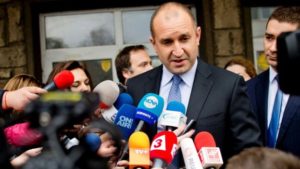by WorldTribune Staff, November 14, 2016
Candidates who pledged to forge closer ties to Russia won presidential elections in Bulgaria and Moldova on Nov. 13.
In Bulgaria, exit polls showed Socialist party candidate Rumen Radev garnered 58 percent of the vote compared to 35 percent for Tsetska Tsacheva of the ruling GERB party. The result prompted center-right Prime Minister Boiko Borisov to pledge to resign.

In Moldova, Socialist candidate Igor Dodon won with 54 percent over pro-European challenger Maia Sandu, who had just under 45 percent.
Most of the key decisions in Bulgaria are made by the parliament, but the president, who leads the armed forces, can sway public opinion and has the power to send legislation back to parliament.
Radev has called for an end to EU sanctions against Russia and said Bulgaria should be pragmatic in its approach to any international law violations by Moscow when it annexed Crimea.
Radev, a former air force commander, also said he hoped for good dialogue both with the United States and Russia and expressed hopes that with a new president in Washington, there will be a drop in confrontation between the West and Moscow.
“In his election campaign (Donald Trump), already elected, said clearly that he will work for a better dialogue with Russia. That gives us hope, a big hope, for a peaceful solution to the conflicts both in Syria and in Ukraine and for a decrease of the confrontation,” Radev said.
Dodon has vowed to put the brakes on seven years of closer integration with the EU in Moldova.
“I am president for the whole country, for those who voted for me and those who voted against,” Dodon told journalists.
Dodon’s promise to pursue closer ties with Russia rather than the European Union is in direct conflict with the pro-European stance of the current government.
Moldova signed a political and trade agreement with the European bloc in 2014 that damaged its ties with Moscow, which imposed trade restrictions on Moldovan farming exports.
Dodon’s Socialist party wants to scrap that agreement in favor of joining a Eurasian economic union dominated by Russia.
